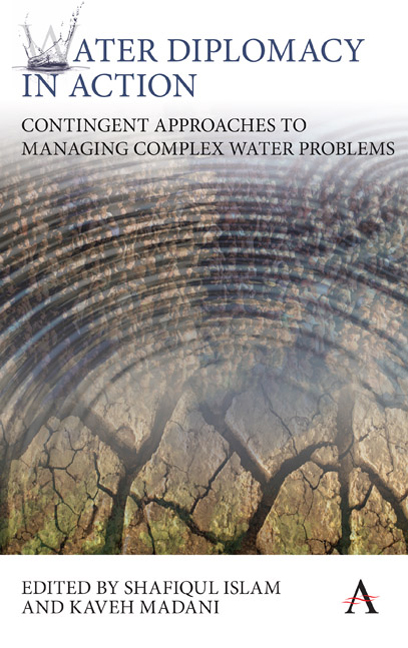Book contents
- Frontmatter
- Contents
- List of Figures
- List of Tables
- The Blind Men, the Elephant and the Well: A Parable for Complexity and Contingency
- Preface
- Part I ROOTS AND CAUSES OF COMPLEXITY AND CONTINGENCY IN WATER PROBLEMS
- Part II TOOLS, TECHNIQUES, MODELS AND ANALYSES TO RESOLVE COMPLEX WATER PROBLEMS
- Chapter Three Ten Bankruptcy Methods for Resolving Natural Resource Allocation Conflicts
- Chapter Four Flexible Design of Water Infrastructure Systems
- Chapter Five Extreme Value Analysis for Modeling Nonstationary Hydrologic Change
- Chapter Six The Water– Food Nexus and Virtual Water Trade
- Chapter Seven A Hybrid Analytical Approach for Modeling the Dynamics of Interactions for Complex Water Problems
- Chapter Eight A Call for Capacity Development for Improved Water Diplomacy
- Chapter Nine Water Complexity and Physics- Guided Data Mining
- Part III CASE STUDIES
- Notes on Contributors
- Index
Chapter Six - The Water– Food Nexus and Virtual Water Trade
from Part II - TOOLS, TECHNIQUES, MODELS AND ANALYSES TO RESOLVE COMPLEX WATER PROBLEMS
Published online by Cambridge University Press: 10 January 2018
- Frontmatter
- Contents
- List of Figures
- List of Tables
- The Blind Men, the Elephant and the Well: A Parable for Complexity and Contingency
- Preface
- Part I ROOTS AND CAUSES OF COMPLEXITY AND CONTINGENCY IN WATER PROBLEMS
- Part II TOOLS, TECHNIQUES, MODELS AND ANALYSES TO RESOLVE COMPLEX WATER PROBLEMS
- Chapter Three Ten Bankruptcy Methods for Resolving Natural Resource Allocation Conflicts
- Chapter Four Flexible Design of Water Infrastructure Systems
- Chapter Five Extreme Value Analysis for Modeling Nonstationary Hydrologic Change
- Chapter Six The Water– Food Nexus and Virtual Water Trade
- Chapter Seven A Hybrid Analytical Approach for Modeling the Dynamics of Interactions for Complex Water Problems
- Chapter Eight A Call for Capacity Development for Improved Water Diplomacy
- Chapter Nine Water Complexity and Physics- Guided Data Mining
- Part III CASE STUDIES
- Notes on Contributors
- Index
Summary
Abstract
Most of the human appropriation of freshwater resources on Earth is used for agriculture, and water availability is a major factor constraining mankind's ability to meet the future needs for food by the growing and increasingly burgeoning human population. Many countries are in conditions of chronic food deficit and rely on food imported from other regions of the world. What is the impact of the virtual transfer of water associated with international food trade? Here we analyze the global patterns of virtual water trade and evaluate how they affect the ethical and physical links between societies and the water resources that sustain them. In the last 25 years, societal reliance on trade has doubled. Today, about one fourth of the water used for food production worldwide is accessed through virtual water trade. The globalization of water prevents the emergence of famine in water- scarce regions, increases equality in access to water and allows for more water- efficient food production. It also entails, however, loss of environmental stewardship, increase in trade dependency and reduced societal resilience to drought.
Introduction
Human societies rely on freshwater resources for a number of activities, including drinking, household usage and industrial and agricultural production (e.g., Gleick, 1993; Rosegrant et al. 2009). Water consumption for food production exceeds by far all the other societal appropriations of freshwater resources (Falkenmark and Rockstrom 2006). In fact, about 85 percent of the human consumption of water is used for crop and livestock production. Locally, however, household and industrial uses can be predominant, particularly in major urban areas. Securing water resources for agriculture, while reconciling the competing water needs of growing cities and surrounding rural areas, is a major challenge of our time.
In the last few decades the unprecedented increases in global crop production, fueled by the recent availability of nitrogen fertilizers (Erisman et al. 2008), has led to the misconception that mankind will never again face a food crisis. Water remains, however, an important limiting factor controlling food production. With an ever- increasing global population, the ability to maintain adequate food supplies with limited water resources has become a pressing concern (Falkenmark and Rockstrom 2004).
- Type
- Chapter
- Information
- Water Diplomacy in ActionContingent Approaches to Managing Complex Water Problems, pp. 95 - 110Publisher: Anthem PressPrint publication year: 2017



